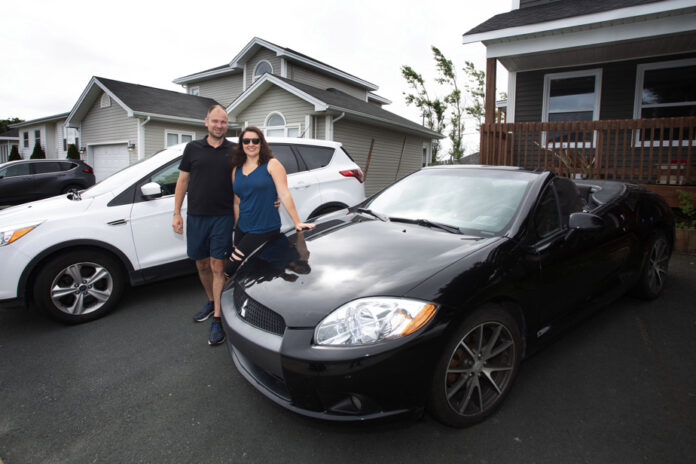When Jennifer Cummings flew to Florida from St. John’s, Newfoundland last summer, she chose to arrive in style.
The 41-year-old signed up on a peer-to-peer rental platform and rented a shiny white Alfa Romeo SUV from her private owner.
“I went for the most exotic car that was a bit in my price range,” Cummings said of the Italian luxury vehicle, which cost her $150 for a 24-hour stay.
“I felt very important driving around Florida to the beaches for the day in this luxury European car. »
Meanwhile, her mother — with her on the trip to Fort Lauderdale — ended up renting the exact same car she drove home.
Their getaway to the sun happened just months after Ms. Cummings became a “host” on Turo, one of several car-sharing platforms that operates on a peer-to-peer model – the same platform as she used to rent the Alfa Romeo.
It’s like Airbnb, but for cars.
While the booming sector has already seen some companies pull out, Turo, along with ongoing offerings from Communauto and Uber, provide alternatives that can save users money, or at least offer more choice, as the car rental market remains tight.
“It’s a little more customizable. You can choose your drop off locations, choose where you want to leave it,” said Cummings, who is both a host owner and — on vacation — a user.
She went from hosting two vehicles to eight in just over a year, including a BMW X1 SUV, a Chevrolet Cruze sedan and a Mitsubishi Spyder convertible. The price per day ranges from $99 to $175.
Turo, which launched in Ontario, Quebec and Alberta in 2016, and has since expanded to British Columbia and Atlantic Canada, allows hosts to list their car for free. They pay a 25% commission to the platform to cover insurance as well as marketing, advertising, and customer service.
The pricing model positions peer-to-peer rental platforms as a rival to rental services, more so than hourly car-sharing companies such as British Columbia’s Zipcar and Evo.
“It’s a bit more rental than carsharing,” said Marco Viviani, director of strategic development for carsharing company Communauto.
“People use it for longer trips or day trips. But often you have to travel to get the car,” he said. By contrast, standard carsharing is “shopping for groceries, going…buying flowers, taking the kids to the football game.”
Communauto plans to launch a peer-to-peer rental service in the next few years, he said, although there is no set date.
This operation would make it possible to increase the number of its members, which amounts to several tens of thousands, and to complete its fleet of 3,500 cars in Montreal, as well as 1,500 others in Quebec, Ontario, Alberta, New Scotland and Paris.
Uber also plans to launch such a service later this year in Toronto called Uber Carshare after buying Australian-based car-sharing network Car Next Door last year.
This news comes as the popularity of peer-to-peer rentals appears to be on the rise.
The number of people who signed up for Turo doubled in Canada in 2022. “We’re talking about hundreds of thousands of Canadians who used Turo for their travel needs last year,” said Cédric Mathieu, Vice President of Tour Canada.
“We have a lot of Teslas… Customers love having access to these electric cars to drive and experience for a few days, and even use the platform almost as an extended trial opportunity. »
Tens of thousands of hosts have also signed up. The average monthly income is $732, according to Mathieu. “This goes a long way towards offsetting the high cost of owning a car in Canada. »
A standard insurance service is available for owners. It protects against damage in the event of collision and theft, with 2 million liability coverage.
“However, if users do not purchase the additional insurance or use their credit card, as many do, with rental car coverage, they are not covered for damage to my car.” , Ms. Cummings noted.
The peer-to-peer rental business model has already been tried and proven insufficient, running into insurance issues, legal lock-ups and scale issues. Turo was effectively banned in New York until last year for reasons related to state insurance laws. The Competition Bureau last year forced the company to end its policy of preventing a host from also listing the vehicle on other platforms, following an investigation by the agency.
While hosts are required to submit proof of service every year, user experiences may vary from rental to rental, with some cars being quieter or cleaner than others, even if it’s the same model. Reviews provide a way to gauge quality.
Additionally, charges for items ranging from car seats to airport fees can inflate the bill.
Also, hosts tend to use their cars when demand is highest, making peer-to-peer rentals less “reliable,” said Communauto’s Viviani.
“This is contrary to what happens with Airbnb – when people go on vacation, they leave their house…. This is why peer-to-peer rental platforms often have a large number of cars registered, but a small number of cars available. »
Nevertheless, with car rental prices plummeting and the departure of many car-sharing companies now in the rearview mirror – Car2Go, General Motors’ Maven, Hertz Connect and Uhaul, Car Share have all closed or left North America – peer-to-peer leasing offers a less rigid, but also less consistent alternative.
Many may be uncomfortable renting their personal vehicle, but the benefits are clear, Cummings said. She said she makes between $70,000 and $80,000 a year – “not counting the thousands of dollars we spend on maintenance” – mostly from visitors from Newfoundland.
“If you call your car ‘my baby’, this isn’t the place for you,” she concluded.















